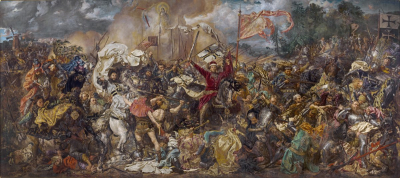The Battle of Grunwald, Battle of algiris or First Battle of Tannenberg was fought on 15 July 1410 during the PolishLithuanianTeutonic War. The alliance of the Crown of the Kingdom of Poland and the Grand Duchy of Lithuania, led respectively by King Wadysaw II Jagieo (Jogaila) and Grand Duke Vytautas, decisively defeated the German Teutonic Order, led by Grand Master Ulrich von Jungingen. Most of the Teutonic Order's leadership were killed or taken prisoner. Although defeated, the Teutonic Order withstood the siege of the Malbork Castle and suffered minimal territorial losses at the Peace of Thorn (1411), with other territorial disputes continuing until the Treaty of Melno in 1422. The order, however, never recovered their former power, and the financial burden of war reparations caused internal conflicts and an economic downturn in the lands controlled by them. The battle shifted the balance of power in Central and Eastern Europe and marked the rise of the PolishLithuanian union as the dominant regional political and military force.The battle was one of the largest in medieval Europe. The battle is viewed as one of the most important victories in the histories of Poland and Lithuania. It is also commemorated in Ukraine and Belarus. It has been used as a source of romantic legends and national pride, becoming a larger symbol of struggle against foreign invaders. During the 20th century, the battle was used in Nazi German and Soviet propaganda campaigns. Only in recent decades have historians moved towards a dispassionate, scholarly assessment of the battle, reconciling the previous narratives, which differed widely by nation.
The Polish–Lithuanian–Teutonic War, also known as the Great War, was a war that occurred between 1409 and 1411 between the Teutonic Knights and the allied Kingdom of Poland and Grand Duchy of Lithuania. Inspired by the local Samogitian uprising, the war began with a Teutonic invasion of Poland in August 1409. As neither side was ready for a full-scale war, Wenceslaus IV of Bohemia brokered a nine-month truce.
After the truce expired in June 1410, the military-religious monks were decisively defeated in the Battle of Grunwald, one of the largest battles in medieval Europe. Most of the Teutonic leadership was killed or taken prisoner. Although they were defeated, the Teutonic Knights withstood the siege on their capital in Marienburg (Malbork) and suffered only minimal territorial losses in the Peace of Thorn (1411). Territorial disputes lasted until the Peace of Melno of 1422.
However, the Knights never recovered their former power, and the financial burden of war reparations caused internal conflicts and economic decline in their lands. The war shifted the balance of power in Central Europe and marked the rise of the Polish–Lithuanian union as the dominant power in the region.

 English
English  español
español  français
français  português
português  русский
русский  العربية
العربية  简体中文
简体中文 
